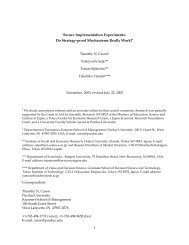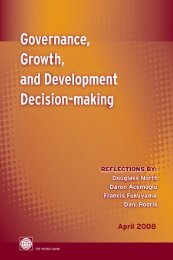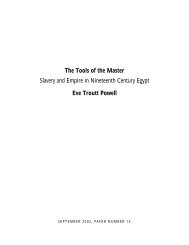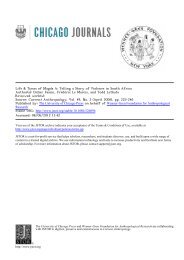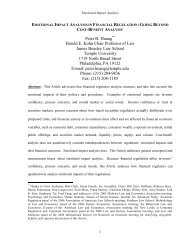Compassion and Repression: The Moral Economy of Immigration ...
Compassion and Repression: The Moral Economy of Immigration ...
Compassion and Repression: The Moral Economy of Immigration ...
Create successful ePaper yourself
Turn your PDF publications into a flip-book with our unique Google optimized e-Paper software.
IMMIGRATION POLICIES IN FRANCE 375<br />
it was more pr<strong>of</strong>oundly a sign <strong>of</strong> structural changes occurring in international<br />
migration. At the global level, the rapid transformation <strong>of</strong> a “new world order”<br />
determined an exacerbation <strong>of</strong> nationalisms <strong>and</strong> transnational processes resulting,<br />
on the one h<strong>and</strong>, in a series <strong>of</strong> regional conflicts <strong>and</strong>, on the other h<strong>and</strong>, in the<br />
development <strong>of</strong> cl<strong>and</strong>estine immigration networks. Both phenomena led to an acceleration<br />
in the movements <strong>of</strong> human beings (Kearney 1995). In the local logic,<br />
with increasingly restrictive immigration laws, asylum became one <strong>of</strong> the only<br />
remaining “avenues <strong>of</strong> access” to legal status, thus facilitating a lack <strong>of</strong> distinction<br />
between political <strong>and</strong> economic motives (Watters 2001). Confronted by an increase<br />
in claims, the most common political reaction was to denounce the “crisis in asylum.”<br />
<strong>The</strong> socialist Prime Minister Michel Rocard made his famous statement,<br />
“France cannot welcome all the misery <strong>of</strong> the world.” This rhetoric reinforced the<br />
confusion between economic immigrants <strong>and</strong> political refugees, thereby discrediting<br />
the latter. Asylum seekers became suspect. Soon the dramatization <strong>of</strong> this<br />
discourse legitimized the use <strong>of</strong> more severe criteria for recognition <strong>of</strong> legal status<br />
<strong>and</strong> an increasing restriction <strong>of</strong> social rights.<br />
As Aristide Zolberg (2001) has suggested: “Indeed the prevailing sense <strong>of</strong><br />
an ‘international migration crisis’ has pr<strong>of</strong>oundly inflected the consideration <strong>of</strong><br />
policy alternatives. In particular, it has been invoked to justify draconian measures<br />
to protect national borders, even at the expense <strong>of</strong> obligations towards refugees.”<br />
<strong>The</strong> story <strong>of</strong> the East Sea illustrates how asylum has become a concern <strong>of</strong> ordinary<br />
policing, interrupted only by specific political emergencies that arouse temporary<br />
public sympathy toward victims. <strong>The</strong> dramas <strong>of</strong> Bosnia <strong>and</strong> Kosovo are examples<br />
<strong>of</strong> these fitful displays <strong>of</strong> generosity when the political elite tries to follow or<br />
even anticipate public opinion (Rosenberg 1995). However, the victims <strong>of</strong> violence<br />
very soon become mere illegal immigrants again, <strong>and</strong> they are hunted down as the<br />
Bosnians <strong>and</strong> Kosovares have been on the shores <strong>of</strong> Italy. Episodes <strong>of</strong> compassion<br />
toward refugees thus appear as privileged moments <strong>of</strong> collective redemption<br />
eluding the common law <strong>of</strong> their repression.<br />
However, to make this repression socially acceptable, one has to disqualify<br />
asylum seekers. Here, the performative power <strong>of</strong> words is particularly effective<br />
in attaining this objective (Fassin 1996). <strong>The</strong> claimants are commonly designated<br />
as cl<strong>and</strong>estins, thus justifying <strong>of</strong>ficial actions against them, such as sending them<br />
to detention centers or driving them back to their countries. Even the services in<br />
charge <strong>of</strong> the reception <strong>of</strong> asylum seekers seem to have internalized this negative<br />
representation. A social worker in one <strong>of</strong> my studies explained, for example, that<br />
although such claimants had the <strong>of</strong>ficial provisional status <strong>of</strong> asylum seekers, she<br />
considered them to be sans-papiers (i.e., undocumented) because she knew that<br />
most <strong>of</strong> them would end up as such. Her anticipation <strong>of</strong> the eventual outcome, which<br />
was statistically correct in more than eight cases out <strong>of</strong> ten, led her to deprive them<br />
<strong>of</strong> universal social security benefits, for which she substituted less beneficial <strong>and</strong><br />
clearly stigmatized charitable medical aid. In this process <strong>of</strong> disqualification <strong>of</strong><br />
refugees, successive French governments developed three strategies.



